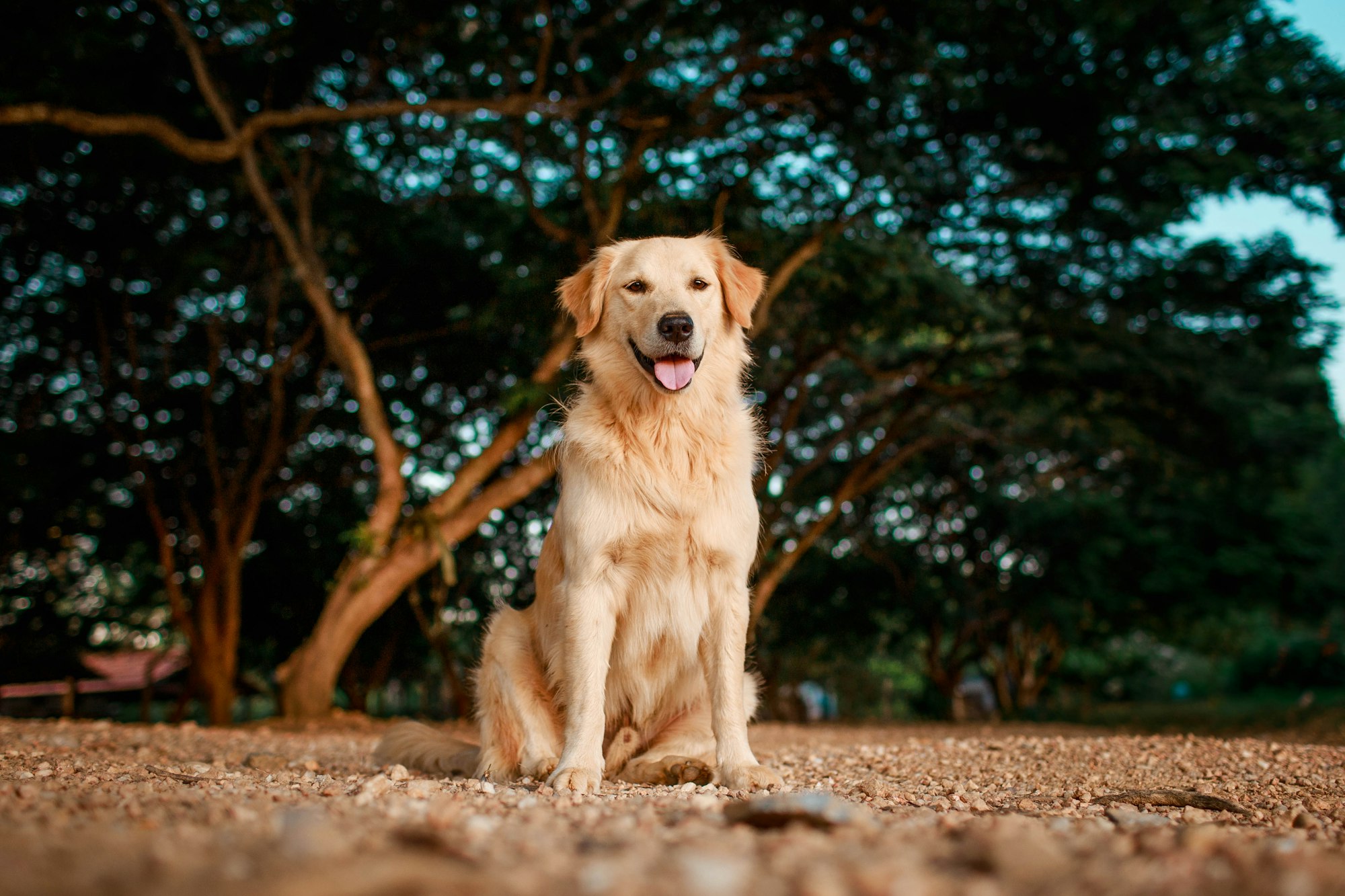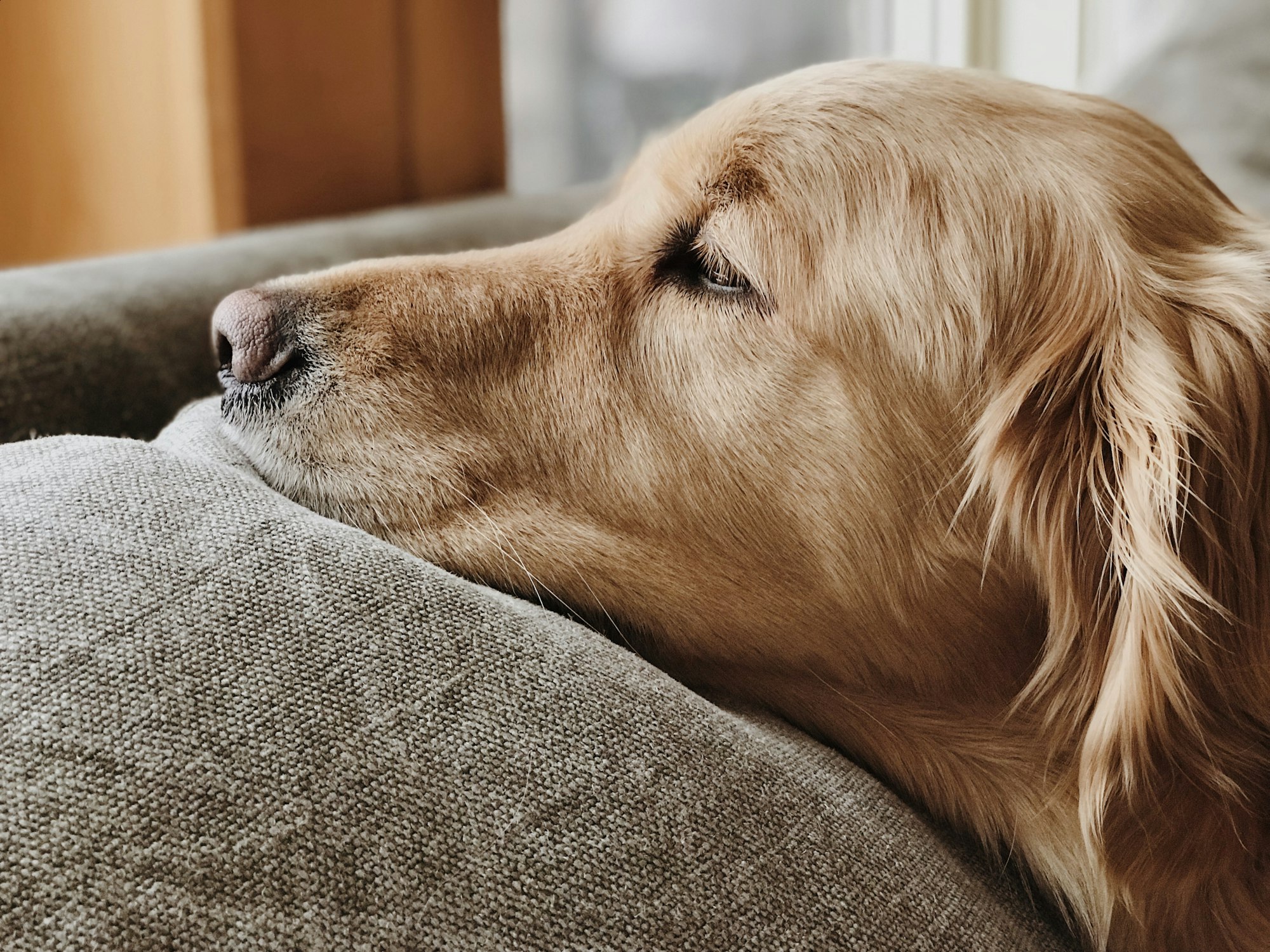Golden Retrievers are not just pets; they are beloved members of the family. As responsible pet owners, ensuring their well-being and extending their lifespan becomes a priority.
Welcoming a Golden Retriever into your home is a joyous occasion. These friendly, intelligent dogs become an integral part of the family, bringing happiness and companionship. As a pet owner, it's natural to want the best for your furry friend, and one way to express your love is by taking steps to extend their lifespan. Here are 7 essential tips to help your Golden Retriever live a longer, healthier life.

Tip 1: Healthy Diet and Regular Exercise
Healthy Diet Matters
Providing your Golden Retriever with a healthy diet is the cornerstone of their well-being. A balanced and nutritious diet is not only essential for their overall health but also contributes significantly to their lifespan. Here's what you need to know about ensuring your furry friend gets the right nutrients:
Importance of a Balanced Diet: Golden Retrievers, known for their friendly disposition and energetic nature, require a diet that meets their specific nutritional needs. A balanced diet supports their growth, maintains a shiny coat, and ensures proper development of muscles and bones.
Specific Nutrients for Golden Retrievers: Consider the unique needs of Golden Retrievers when selecting their food. Look for dog food rich in high-quality proteins, as these are crucial for muscle development. Additionally, include omega-3 fatty acids for a healthy coat and joints. Consult with your veterinarian to determine the ideal balance of nutrients based on your dog's age, weight, and activity level.
Recommended Feeding Schedule: Establishing a consistent feeding schedule is vital for your Golden Retriever's health. Divide their daily food portion into two or three meals, depending on their age and individual requirements. Avoid overfeeding, as obesity can lead to various health issues. Monitor their weight and adjust portions accordingly.

Regular Exercise Routine
Golden Retrievers are known for their boundless energy, and regular exercise is crucial to keep them physically and mentally stimulated. Here's how to develop a consistent exercise routine that promotes a long and healthy life:
The Significance of Exercise for Golden Retrievers: Exercise is not just about keeping your Golden Retriever physically fit; it also plays a vital role in their mental well-being. Lack of exercise can lead to boredom and destructive behavior. Daily walks, playtime, and activities like fetch or agility training are excellent ways to keep them active and engaged.
Types of Activities Suitable for Them: Golden Retrievers thrive on various activities. Incorporate a mix of aerobic exercises, such as running or swimming, and mental stimulation, like puzzle games or obedience training. Tailor the activities to your dog's age and fitness level, ensuring they get a well-rounded workout.
Developing a Consistent Exercise Routine: Consistency is key when it comes to exercising your Golden Retriever. Aim for at least 30 minutes to an hour of exercise each day, depending on their age and energy level. Establish a routine that includes both physical and mental activities, and be mindful of weather conditions to ensure their safety during outdoor activities.
By prioritizing a healthy diet and regular exercise routine, you're laying the foundation for a longer, happier life for your Golden Retriever. Remember, each dog is unique, so tailor their diet and exercise plan to meet their individual needs.
Thing 2: Veterinary Care and Mental Stimulation
Routine Veterinary Check-ups: Regular veterinary check-ups are a crucial aspect of responsible pet ownership, contributing significantly to the overall well-being and longevity of your Golden Retriever. Here's why routine vet visits are essential and what you should expect:
The Role of Regular Vet Visits in Preventive Care: Preventive care is key to identifying and addressing potential health issues before they become more serious. Routine veterinary check-ups allow your veterinarian to assess your Golden Retriever's overall health, monitor weight, and conduct screenings for common conditions.
Vaccination Schedules: Maintaining up-to-date vaccinations is vital to protect your Golden Retriever from preventable diseases. Your vet will establish a vaccination schedule tailored to your dog's age, lifestyle, and potential exposure risks. Regular vaccinations not only safeguard your pet but also contribute to the well-being of the entire community.
Identifying and Addressing Health Issues Early: Early detection of health issues is crucial for effective treatment. During routine check-ups, your veterinarian will conduct a thorough physical examination, checking for signs of dental problems, skin issues, and abnormalities. Regular blood tests and screenings may also be recommended, especially as your Golden Retriever ages.
Mental Stimulation
Golden Retrievers are not just physically active; they are intelligent dogs that require mental stimulation to thrive. Engaging their minds contributes to a happy and well-balanced life. Here's how to provide the mental stimulation your Golden Retriever needs:
Mental Exercises for a Happy and Healthy Dog: Incorporate activities that challenge your Golden Retriever's cognitive abilities. Puzzle toys, interactive feeders, and games that involve problem-solving are excellent choices. These activities not only keep their minds sharp but also prevent boredom, reducing the likelihood of destructive behavior.
Interactive Toys and Games: Invest in a variety of interactive dog toys to keep your Golden Retriever entertained. Toys that dispense treats or require them to figure out how to access a reward can be especially engaging. Rotate the toys regularly to maintain novelty and keep their interest levels high.
Building a Bond Through Mental Stimulation: Engaging in mental stimulation activities is not only about keeping your Golden Retriever entertained; it's also an opportunity to strengthen the bond between you and your furry friend. Participate in training sessions, teach them new tricks, and make learning a positive and enjoyable experience.
By prioritizing routine veterinary check-ups and providing ample mental stimulation, you are addressing both the physical and mental aspects of your Golden Retriever's well-being.
Thing 3: Maintaining Weight and Grooming Practices
Maintaining Ideal Weight
Maintaining an ideal weight is a crucial factor in ensuring the overall health and longevity of your Golden Retriever. Here's why it matters and how to manage their weight effectively:
The Impact of Weight on a Dog's Lifespan: Maintaining a healthy weight is more than just aesthetics; it directly impacts your Golden Retriever's well-being. Obesity in dogs can lead to various health issues, including joint problems, diabetes, and a reduced lifespan. Keeping your dog at an ideal weight contributes to their overall mobility and vitality.
How to Monitor and Manage Weight Effectively: Regularly monitor your Golden Retriever's weight and body condition. Consult with your veterinarian to determine the ideal weight range for your dog's breed, age, and size. Adjust their diet and feeding portions accordingly, and ensure they get enough exercise to burn calories. Avoid feeding table scraps and high-calorie treats, as these can contribute to weight gain.
Grooming Practices
Regular grooming is not just about keeping your Golden Retriever looking good; it's an essential aspect of their care routine. Proper grooming contributes to their health and well-being in several ways:

Importance of Regular Grooming for Health: Grooming helps prevent skin issues, matting, and the formation of hot spots. Brush your Golden Retriever's coat regularly to remove loose fur and distribute natural oils. This not only keeps their coat shiny but also allows you to detect any lumps, bumps, or abnormalities early on.
Tips for Grooming Golden Retrievers: Golden Retrievers have a dense double coat that requires regular attention. Brush their coat at least two to three times a week to prevent mats and reduce shedding. Bathe them as needed, typically every two to three months, or more frequently if they get dirty. Trim their nails regularly and clean their ears to prevent infections.
Professional Grooming When Necessary: While basic grooming tasks can be done at home, consider professional grooming for more complex tasks, such as coat trimming or if your Golden Retriever has a particularly thick coat. Professional groomers have the expertise and tools to ensure your dog's coat is well-maintained and free of tangles.
By paying attention to your Golden Retriever's weight and incorporating proper grooming practices into their routine, you are actively contributing to their overall health and quality of life.
Thing 4: Safe Environment and Socialization Training
Creating a Safe Environment
Ensuring a safe environment is a fundamental aspect of responsible pet ownership, especially when it comes to the well-being of your Golden Retriever. Here's why creating a safe space is crucial and how to go about it:
Identifying Potential Hazards in the Home: Golden Retrievers are known for their curious nature, making it essential to identify and eliminate potential hazards in your home. Secure electrical cords, keep toxic substances out of reach, and ensure that small objects your dog could swallow are stored away. This proactive approach helps prevent accidents and keeps your Golden Retriever safe.
Ensuring a Safe Outdoor Space: If you have a yard or outdoor space for your Golden Retriever to enjoy, make sure it's securely fenced. Check for any gaps or potential escape routes. Remove poisonous plants from the yard, and be mindful of any hazards, such as sharp objects or potential digging spots. Providing a safe outdoor environment allows your dog to explore and play without unnecessary risks.
Socialization and Training
Socialization and training are vital components of your Golden Retriever's development, contributing not only to their behavior but also to their overall well-being. Here's how to foster positive socialization and effective training:
The Role of Socialization in a Dog's Well-being: Exposing your Golden Retriever to various environments, people, and other animals from a young age is crucial for their social development. Socialization helps prevent behavioral issues and ensures your dog is comfortable and well-behaved in different situations. Introduce them to new experiences gradually and positively reinforce good behavior.
Basic Training Tips for a Well-behaved Dog: Basic obedience training is essential for a well-behaved Golden Retriever. Start with commands like sit, stay, and come. Use positive reinforcement, such as treats and praise, to reward good behavior. Consistency is key, so incorporate short training sessions into your daily routine.
The Need for a Balanced Approach: Balancing affection and discipline is crucial in training your Golden Retriever. Shower them with love and positive reinforcement when they behave well, but also establish clear boundaries. Consistent rules help your dog understand what is expected of them, creating a harmonious relationship based on trust and respect.
By creating a safe environment and focusing on socialization and training, you are laying the groundwork for a well-adjusted and happy Golden Retriever.
Thing 5: Common Health Issues and Quality Sleep
Understanding Common Health Issues
Being aware of common health issues in Golden Retrievers is crucial for proactive and preventive care. Here's what you need to know about recognizing and addressing these issues:
- Hip Dysplasia: Golden Retrievers are prone to hip dysplasia, a genetic condition where the hip joint doesn't develop properly. Watch for signs of difficulty in movement, lameness, or reluctance to exercise.
- Ear Infections: Due to their floppy ears, Golden Retrievers are susceptible to ear infections. Regularly check and clean their ears, and be attentive to signs like scratching or head shaking.
- Allergies: Skin allergies are common, leading to itching, redness, or hot spots. Identifying and addressing allergens can help manage these issues.
- Heart Disease: Some Golden Retrievers may be predisposed to heart conditions. Regular vet check-ups can aid in early detection and management.
Recognizing Symptoms and Seeking Prompt Veterinary Care: Knowing the symptoms of common health issues allows for early intervention. Keep an eye out for changes in behavior, appetite, or energy levels. Any signs of discomfort, lethargy, or unusual behavior warrant a prompt visit to the veterinarian. Early detection often results in more effective treatment and a better prognosis.
Quality Sleep Matters
Just like humans, quality sleep is essential for your Golden Retriever's overall health and well-being. Here's why prioritizing their sleep is crucial:
The Importance of Sufficient and Quality Sleep: Dogs, including Golden Retrievers, require adequate sleep for physical and mental recovery. Quality sleep supports their immune system, promotes healthy growth, and contributes to a balanced temperament. Ensuring your Golden Retriever gets sufficient sleep is a fundamental aspect of their care.
Creating a Comfortable Sleeping Environment: Provide a comfortable and quiet sleeping area for your Golden Retriever. Invest in a cozy bed that offers support for their joints. Consider placing the bed in a quiet and draft-free area to minimize disturbances, allowing your dog to enjoy uninterrupted sleep.
Establishing a Consistent Sleeping Routine: Dogs thrive on routine, and establishing a consistent sleeping routine is beneficial. Aim for a set bedtime and wake-up time. This routine not only helps regulate their internal clock but also ensures they get the recommended amount of sleep for their age and activity level.

Understanding common health issues and prioritizing quality sleep are integral components of responsible Golden Retriever care.
Thing 6: Balancing Bond and Adapting Care
Balancing Affection and Discipline
Finding the right balance between affection and discipline is essential for fostering a healthy and well-behaved Golden Retriever. Here's why it matters and how to achieve that delicate equilibrium:
- Positive Reinforcement: Shower your Golden Retriever with affection and positive reinforcement when they exhibit good behavior. This could include treats, praise, or playtime. Positive reinforcement strengthens the bond between you and your furry friend.
- Clear Boundaries: While affection is crucial, it's equally important to establish clear boundaries. Consistent rules help your dog understand what is expected of them. This balanced approach creates a harmonious relationship based on trust and mutual respect.
Building a Strong Bond with Your Golden Retriever
- Quality Time: Spend quality time with your Golden Retriever through activities they enjoy. Whether it's playing fetch, going for walks, or simply lounging together, these moments strengthen your bond.
- Training Sessions: Use training sessions not only to teach commands but also as an opportunity for positive interaction. This reinforces your role as a leader while making learning enjoyable for your dog.
Adapting Care as They Age
As your Golden Retriever enters their senior years, adapting their care routine is essential for maintaining their health and comfort. Here's how to adjust your care practices:
- More Frequent Vet Visits: Increase the frequency of veterinary check-ups to catch and address age-related issues early. Regular monitoring helps manage conditions such as arthritis or dental problems.
- Modified Diet: Adjust their diet to meet changing nutritional needs. Senior dog food formulations often include ingredients that support joint health and are easier on the digestive system.
- Special Considerations: Be attentive to signs of aging, such as reduced mobility, changes in appetite, or altered sleep patterns. Adjust exercise routines to be gentler, and provide comfortable bedding for joint support.
- Maintaining Mental Stimulation: Continue mental stimulation activities, but adapt them to your senior dog's abilities. Puzzle toys or gentler training exercises can keep their minds active.
Thing 7. Supplements for Longevity
As your Golden Retriever ages, incorporating supplements into their diet may support overall longevity. Here's an overview of supplements that could benefit your aging furry companion:

Overview of Supplements That May Support a Longer Life
- Omega-3 Fatty Acids: Omega-3s promote joint health, reduce inflammation, and contribute to a shiny coat. Fish oil supplements are a common source.
- Glucosamine and Chondroitin: These supplements support joint health and may alleviate symptoms of arthritis or hip dysplasia in senior dogs.
- Antioxidants: Antioxidants help combat oxidative stress, potentially slowing down the aging process. Vitamin E and C supplements are examples.
Consultation with a Vet Before Introducing Supplements: Before introducing any supplements, consult with your veterinarian. They can provide personalized advice based on your Golden Retriever's health status, age, and specific needs. A vet's guidance ensures that supplements are appropriate and safe for your dog's well-being.
Conclusion
Extending your Golden Retriever's lifespan involves a holistic approach to their care. From providing a nutritious diet and regular exercise to preventive veterinary care and mental stimulation, each aspect plays a crucial role. As a responsible pet owner, your commitment to their well-being ensures that your Golden Retriever enjoys a long, healthy, and happy life as a cherished member of your family.
FAQs
- Q1: How often should I take my Golden Retriever to the vet?
- Regular veterinary check-ups are recommended at least once a year for a healthy adult Golden Retriever. However, senior dogs may require more frequent visits.
- Q2: What type of toys is best for mental stimulation?
- Interactive toys, puzzle feeders, and toys that dispense treats are excellent choices to keep your Golden Retriever mentally engaged.
- Q3: Can I groom my Golden Retriever at home?
- While basic grooming tasks like brushing and nail trimming can be done at home, professional grooming may be necessary for more complex tasks, such as coat trimming.
- Q4: Is it normal for Golden Retrievers to gain weight as they age?
- Yes, it's common for older dogs to gain weight due to reduced activity levels. Adjusting their diet and providing low-impact exercise can help manage weight.
- Q5: What signs indicate that my Golden Retriever is aging?
- Signs of aging include reduced energy levels, changes in appetite, graying around the muzzle, and slower movement. Regular veterinary check-ups can help monitor these changes.






